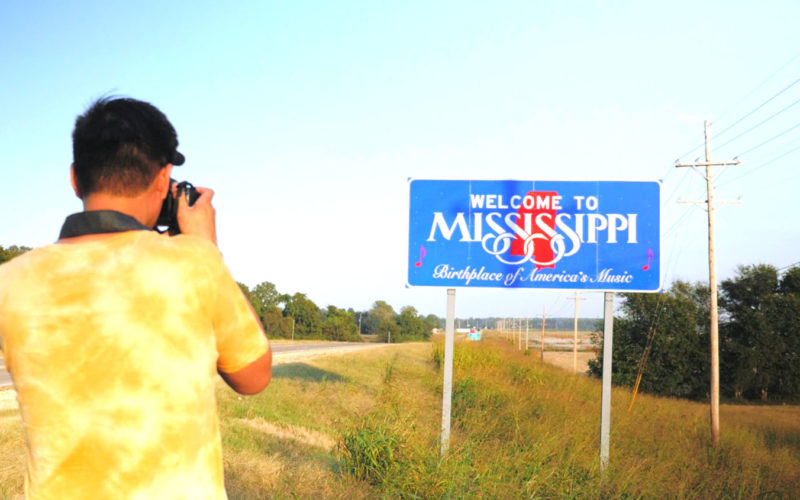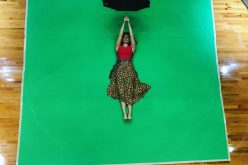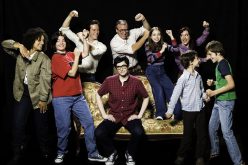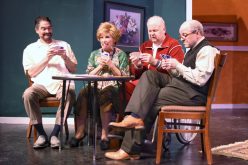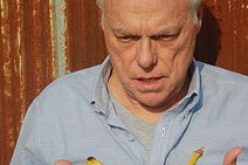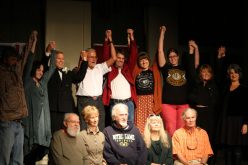LARA JO HIGHTOWER/Special to the Free Weekly
Baldwin Chiu was used to his father’s vague answers when he questioned him about his heritage. But when Chiu had a daughter of his own, he decided vague answers weren’t enough — he wanted to learn more about his family lineage and how and why his Chinese relatives immigrated to America. He was shocked when the search took him to the deep south, and what he learned along the way was both educational and entertaining enough for Chiu and his family to turn the journey into a documentary called “Far East Deep South”, streaming on the Arkansas PBS website now through June 3. Chiu answered some questions for What’s Up! about the process and what he learned along the way.
It sounds as if this was a family research project that ballooned into a much larger study of history — that it went far beyond what you expected it to be at the beginning. Is that accurate?
Yes, definitely, we were just planning a family vacation. We heard that my grandfather and great-grandfather were buried in Mississippi, and we had not known this throughout our life growing up. But when we made that discovery, more recently, my brother decided that we should go out there and try to pay our respects to my grandfather and great-grandfather. My daughter had just been born a year earlier and I thought that she should probably know where her lineage came from, as well — especially after seeing my father hold my daughter. It was the first time I had seen a grandfather and grandchild relationship in my family. So we went out there thinking we’d find two Chinese men buried in Mississippi, and we would throw some flowers on there and pay our respects and go home. We were not expecting to learn about the entire community of Chinese people in Mississippi, or to find the Delta State University Chinese Heritage Museum. When my wife, Larissa Lam, showed up and looked around at the museum, she said, ‘This can’t just be a family film, because there’s so much going on here. We need to make this into a documentary.”
How much of the actual United States history that you learned along the way — things like the Chinese Exclusion Act — were you aware of prior to your family research? Did some of that come as kind of a surprise to you as well?
Prior to going to Mississippi — it was about six, almost seven years ago now — I had just recently learned about the Chinese Exclusion Act, just through conversations with other advocacy groups and historical societies I had started to meet here in California. Once we got to the museum, and we saw some of the signage that talked about what the Chinese Exclusion Act was, it kind of brought back some more understanding of what it was, but we really had no idea the extent of the effect the Chinese Exclusion Act had on our family.
And did that change the way you looked at your family’s history, or its dynamics? Did it adjust your perception of your family’s history in any way?
Certainly. Not just my perception of my family, but the perception of all Chinese and, eventually, all Asian American families. What we discovered was that the Chinese Exclusion Act wasn’t simply a law that happened a long time ago and got fixed eventually. It was a law that had some serious repercussions, and it affected families for a long time, for multiple generations, and it still affects families today. Unfortunately, my father, when he did not have a father to raise him, had no idea that it was the Chinese Exclusion Act that separated his family, and continues to separate our family. We still have family in China that should have actually been born here in the United States — but because of the Chinese Exclusion Act, they never made it over here. My dad was fortunate to be the only one in the direct family to make it over here. And I was able to be born here. But in reality, all of us should have been born here. Even my grandfather should have been born here. But the Chinese Exclusion Act really prevented him from being born here as well. …So many of us have been driven away and our families have been divided and separated for so long.
Part of what the film covers is the relationship between Asian people who moved to the United States and Black Americans, both of whom experienced enormous levels of prejudice and racial violence. It sounds like you discovered some history that shows that the relationships that were forged between those two groups turned out to be productive and beneficial to their livelihoods. Does that hold some lessons for us in the very divisive world we find ourselves in today?
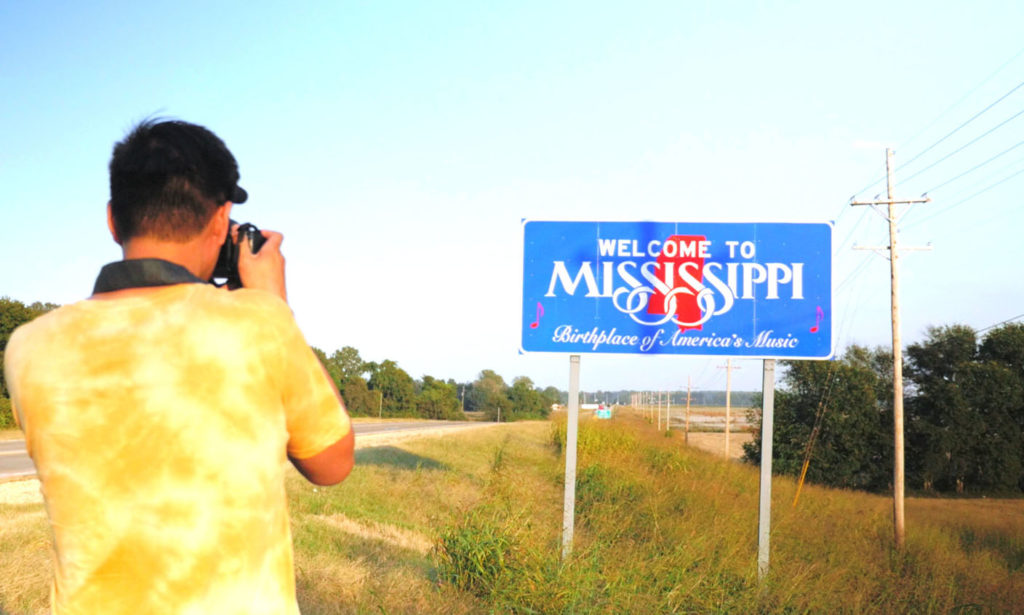
Certainly, that was something we discovered, you know, when we go all the way back to the late 1800s, when Chinese people were first brought into the south to replace slave labor. Plantation owners really looked at all their workers as servants, you know, all the Chinese even though they — Chinese, Black and even Mexicans — were supposed to be sharecropping. But, really, they were the labor force to replace slave labor. Obviously, the discrimination that happened back then was harsh. It’s a lot worse than what we we feel today — although, today, there’s still quite a bit of discrimination going on in our country, unfortunately. Maybe it was because of those shared hardships, that shared prejudice that the early Chinese and the Black community had together — because they were forced to live together, and they weren’t allowed to live, unfortunately, in the white areas. Plantation owners, unfortunately, were trying to rip off both the Chinese and the Black community with their plantation commissaries. So when the Chinese Exclusion Act happened, it basically barred Chinese people from becoming laborers. And it really promoted the Chinese people into leaving the labor market and hoping that they would go home, go back to China. But instead, the Chinese found a way to open up their own grocery stores, working long hours, and the only place they could do that was in the Black neighborhoods. And they found that they could work together with the Black community. They could offer lower prices, they could extend credit, and they would allow their Black customers to walk through the front door. And that forged some friendships, forged some allyship. They had commonality in their neighborhood. They had commonality in the grocery stores and even had commonality with some of the Chinese grocery store owners and community people working on the farms that were actually owned by the Black community. So they were pulling favors for each other in order to survive in an environment that really was not there to benefit them.
We are unfortunately seeing a horrifying uptick in violence against Asian Americans that some attribute to conspiracy theories surrounding the pandemic. Does this make you think this is a particularly well-time rollout for a film like this, that offers some insight into the history of Asian American immigration?
Well, certainly we didn’t think that this was going to be happening six years ago, when we first started filming and making our discoveries. The thing is that I don’t think we can actually just blame the pandemic on these recent attacks, and the violence towards the Asian American community. There’s clearly been this tension already, over the last several years and decades and even generations. I think the pandemic actually just gave an excuse for a lot of those feelings and sentiments to come out. We have to remember that we’re only 6% of the population of this country. So how much threat really is there? How can such a small population garner so much hatred? And unfortunately, the Chinese Exclusion Act is part of it. All the rhetoric that happened all the way back then to demonize and portray the Asian and Chinese communities to be evil, or corrupt, or ugly, or dirty, or unable to become American, has been perpetuated through the years through our education system. And unfortunately, the Chinese Exclusion Act didn’t just exclude the people. It also erased a lot of our history from this country, so the perception is that Chinese, Asians, are foreigners, and not a part of this country and have never contributed to the well being of this country or the growth economically — despite the railroads and all the farming and so many things that this country has benefited from that history. But that knowledge has been essentially erased from our history books. Children are growing up to become adults that don’t know about it. And now you have all this other fear — people can’t separate the difference between the Chinese government and Asian American citizens. And they don’t understand that there’s a huge difference. The reason why there are Asian Americans here in the United States is because they don’t really want to be in China — or they would have stayed in China. So for the for the rest of our country to see our face and assume that we are associated with the government of China — that also, unfortunately. oppresses people. That’s an unfortunate thing in our country. So I think films like ours are necessary to show people how normal we are, to normalize the conversations of ‘Who is American?’ There’s commonality in our struggles, which is unfortunate that we have that history in this country. But there’s also commonality in our successes that we can share with each other. And both of them are just as valid historically, and both of them are just as valid in defining our place in this country.
Your movie specifically touches on racial divides in the deep south — do you think it’s particularly important for those of us living in the south to have access to documentaries like this one?
I would like to say I think it’s important for all the states to know this movie, but I think it does have a more special relationship in the south because it’s the history of the south. The south does get a bad rap sometimes, because the rest of the country sometimes focuses on the dark part of the south’s history, which is undeniably there. What the rest of the country might not know is that some sort of good has come out of [that darkness], like when you talk about struggling together, working through systems and finding ways to break through discrimination. Right. When we showed up in the south for the first time in Mississippi, along the Mississippi Delta, people were not like anxious or stressed out or even surprised to see a Chinese face, an Asian-looking face when we arrived — they were more surprised that we were Californians. So it wasn’t like, ‘Oh, no, those Chinese people are here,’ it was, ‘Oh, what the heck are those Californians doing way out here?’ We were treated great. The Black community embraced us. We weren’t sure how we would feel when we walked into the town of Pace [Miss.], being the only Chinese people walking around with, maybe the grocery store owner that was there, and everyone else was Black. But man, they welcomed us. The Mayor, Levon Jackson, brought us into his house for ribs and, and introduced us to his family and had a whole spread for us in didn’t even consider our ethnic makeup. But we also have to recognize that the South is not a monolith either, that there are so many different variations of the South, someone from Arkansas is different from someone from the Mississippi Delta, which is different from the main part of the Mississippi, which is different from Louisiana, and Alabama, and North and South Carolina, Virginia. Everyone is so different.
I think I’ve asked all of the questions I’ve prepared — is there anything I didn’t ask that I should have, or anything you would like to add?
Sure, I would like to just say that I think our story is not an Asian American story. It’s not a Chinese American story. It’s an American story. For us to impact the education system, being on PBS is a big part of what we’re trying to do. Being in schools is very important. We could fix essentially all this racism and really bring unity to our country in one generation,” he says. “But it requires our youth to become educated, and it requires our adults to allow our young people to learn about the truth of our country, the good and the bad. …If we tell all our stories, and the stories are not just diverse for the sake of diversity, but the stories are diverse for the sake of authenticity, and honesty and truth, then we can truly understand what got us to where we are today, and then we can finally understand what we need to do in order to fix the future.
I really hope that people — and I’m very sensitive to this because we are definitely not trying to erase history, we’re not trying to erase white people history, we’re not trying to say Black history is lesser, because we are a part of all the stories. A friend of mine, who’s a historian, and a professor, he said to me, ‘History doesn’t belong to anybody.’ It doesn’t belong to him, being white, and having written history textbooks. It doesn’t belong to me as an Asian American. It doesn’t belong to the Black community, either. History doesn’t belong to anybody. History just is. And so it’s not a zero sum game. It’s not that if you tell my history, then your history is something has somehow less. For us to exclude any history, good or bad, from any group, takes away from the actual truth of what this country is made of and how the country got to where it is today. I don’t believe we can effectively make the future better unless we understand truly what got us here in the first place. What are the roots of the problems that got us to where we are today? If we tell all our stories, and the stories are not just diverse for the sake of diversity, but the stories are diverse for the sake of authenticity, and honesty and truth, then we truly understand what got us to where we are today. And then we can finally understand what we need to do in order to fix the future.
FAQ
‘Far East Deep South’
WHEN — Streaming through June 3
WHERE — https://watch.myarkansaspbs.org/video/far-east-deep-south-ovijey/
COST — Free
INFO — fareastdeepsouth.com

